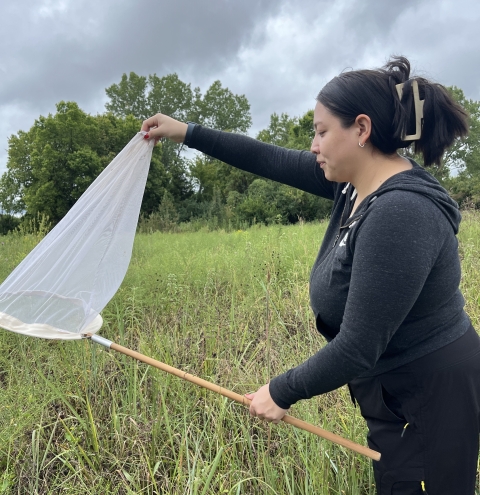Through the changing seasons, migration of living things, and the natural cycle of life and death, people have connected to and cared for the land for ages. For some, their relationship to the land is rooted in their way of life, through culture and traditions. For others, it is evoked from experiences based in adulthood, education, or even chance. Humans are a part of nature and, through the connection to the land, we are able to feel agency in protecting the planet that we call home. Stewards, people that care for the land, have existed throughout human existence. Here at the U.S. Fish and Wildlife Service (USFWS), we are proud to be stewards and believe all can be stewards as well. Today, we honor and celebrate the efforts of one such steward: Aaliyah Provost.
In 2024, new projects came to the Mountain-Prairie Region that prioritized underrepresented and undervalued academic institutions. An Initiative for Increasing Academic Partnerships (IIAP) brought a total of $100,000 to foster new academic partnerships and implement low-cost conservation actions in the region. The USFWS partnered with five institutions to fund training, travel, and equipment to help bring five projects to life. One of these projects was with the Haskell Indian Nations University (Haskell) in Lawrence, Kansas.
Laura Mendenhall, a biologist with the USFWS, partnered with Aaliyah Provost, a university student at Haskell, to establish baseline data on bumble bees, plants, and butterflies in the Haskell Indian Nations University Wetlands. The goal of this project was to develop a dataset and monitoring program, ultimately improving accessibility for Haskell students interested in pollinator, grassland, or wetlands research.
From January to August, Aaliyah and Laura set up monitoring protocols, survey plots, and transects (long pieces of measuring tape or string to mark boundaries). Additionally, they created equipment kits that will aid future students and leave a lasting impact on pollinator conservation in Kansas. The kits include everything needed for bumblebee and butterfly surveys, including nets, vials, coolers, backpacks, clipboards, cameras, ice cube trays (for chilling specimens), bug spray, sunscreen, and first aid kits. Aaliyah and Laura also identified smartphone apps, like iNaturalist, and image-search tools to help bridge plant and insect identification knowledge gaps. Aaliyah and Laura made all their data and tools available to future students and researchers, providing the foundation for consistent, uninterrupted pollinator analysis and monitoring now and into the future.
Aaliyah held this project dear to her and is very excited to share the project with other students at Haskell. This project is “not only for STEM students but any student who is interested in learning more about pollinators and conservation of endangered species,” Aaliyah expresses. With the global insect decline that has been recorded over the past few decades, Aaliyah feels purpose in this project as she was able to contribute to the conservation efforts for many insect species. Just in Kansas, there are multiple pollinator species being considered for listing under the Endangered Species Act.
Reflecting on her transformative journey, Aaliyah shares her experiences:
“I was given the opportunity to travel to the National Conservation Training Center in West Virginia this past June. The trip was to attend a pollinator course and I was able to work alongside other field specialists and gained so much knowledge and experience about bumblebees and field work. This trip was very eye-opening for me to connect with other people who are in science-related positions and gain insight on my future goals. I was able to start exploring other ideas of what I wanted to do with my degree and how I can give back to my Native communities. I am tremendously thankful for this experience and how it has contributed to my future in Environmental Stewardship of Tribal Lands. I hope to continue my education and gain more knowledge and experience so I can return to my homelands and give back to my people through my education. This project makes me very excited for what future Native students will accomplish through it. I am thankful I was able to represent Native Women in STEM through this project and I hope to inspire young Native girls to pursue their own education. I plan to pursue a career in Tribal Land Management/Stewardship and I am very hopeful for what the future holds. I would like to say Pilamayaye (Thank you) to Angelina Adams (Haskell Indian Nations University), Laura Mendenhall (USFWS), and Jason Luginbill (USFWS) for this amazing opportunity and for all the guidance and experience you have shown me.”
Conservation and environmental work are crucial for the future of our planet and the generations to come, and it wouldn’t be possible without our stewards and friends. Through collaborating and uniting efforts while empowering communities, the USFWS continues to conserve, protect, and enhance fish, wildlife, plants, and their habitats for the continuing benefit of the American people. Read about the other IIAP projects in 'Meaningful Connections Through Conservation: Academic Partnerships'.






